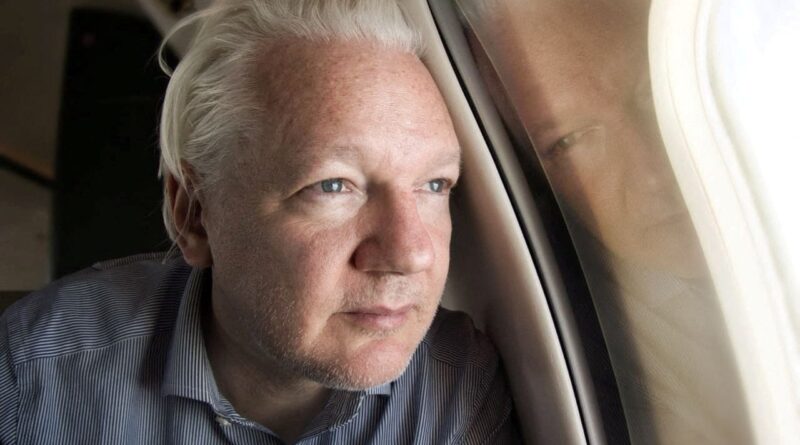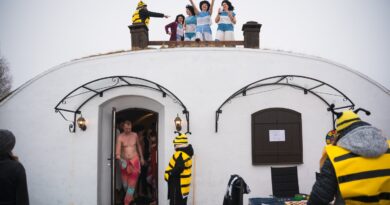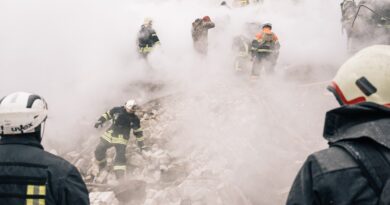Julian Assange’s plea deal sparks global celebration, condemnation
Hours after news of Assange’s expected release broke Monday evening Eastern time, Australian Prime Minister Anthony Albanese told lawmakers that there was nothing to be gained by Assange’s continued imprisonment.
“Regardless of the views that people have about Mr. Assange’s activities, the case has dragged on for too long,” he said, according to a transcript of his remarks provided by his office. “We want him brought home to Australia,” Albanese said.
But former vice president Mike Pence tweeted his opposition to the plea deal, saying Assange’s actions had risked U.S. national security and service members’ lives.
GET CAUGHT UP
Stories to keep you informed
“Julian Assange endangered the lives of our troops in a time of war and should have been prosecuted to the fullest extent of the law,” Pence said. “The Biden administration’s plea deal with Assange is a miscarriage of justice and dishonors the service and sacrifice of the men and women of our Armed Forces and their families.”
Assange’s plane departed London on Monday for the Northern Mariana Islands, a U.S. territory in the Pacific, stopping in Bangkok on Tuesday for a layover. He is due to attend a court hearing in Saipan, the largest island and capital of the Northern Mariana Islands, at 9 a.m. local time Wednesday (7 p.m. Eastern time Tuesday), the Justice Department said in a letter filed Monday evening.
Assange is expected to plead guilty to a single charge of espionage before he returns to his home country of Australia, the DOJ letter said, indicating that he will be sentenced to the 62 months he has already spent imprisoned in London.
Liz Throssell, a spokeswoman for the U.N. Human Rights Office, welcomed Assange’s release from London’s Belmarsh Prison, where he had been jailed for more than five years, adding in a statement that his case and “protracted detention” had raised human rights concerns. “We will continue to monitor developments over the coming days,” she added.
German Foreign Minister Annalena Baerbock also welcomed the news, saying that Assange’s case “was discussed very emotionally all over the world and moved many people,” according to Reuters. Mexican President Andrés Manuel López Obrador tweeted that he was “celebrating” Assange’s exit from prison.
On Tuesday, Assange’s wife, Stella, told BBC radio: “I’m just elated, frankly, it’s incredible — it feels like it’s not real.”
She said Assange’s release had been “touch and go” and only in the past 24 hours it became certain that it was “actually happening.”
Stella Assange said she was limited in what she could say publicly about the plea deal, but confirmed that it concerned one count under the U.S. Espionage Act, and that her husband would plead guilty to it.
“The important thing here is that the deal involved time served, so if he signs it he is able to walk free,” she said, adding that the deal would eventually be made public, without giving further details.
Assange told Reuters that her husband will seek a pardon after he pleads guilty. She described the Espionage Act as “a very serious concern for journalists.” Only the president can grant pardons in the United States.
Vaughan Smith, a restaurant owner who once gave Julian Assange sanctuary at his Norfolk estate in England while he was fighting extradition, said in an emailed statement: “I am delighted for Julian and his wife Stella, and their two children. This matter needed to end, but it is disappointing that the U.S. authorities weren’t able to protect all of our freedoms by dropping the matter entirely.”
James Ball, an early WikiLeaks employee who left after three months at the organization, said that neither Assange nor the United States “can really call this a win.”
“Many journalists — myself included — and many who are no fans of Assange said the prosecution was a risk to press freedom. A plea deal doesn’t change that, and is something Assange would only agree through sheer necessity,” he tweeted. Ball theorized that the plea deal was a “practical choice” for Assange, who has spent years in exile and prison, and for the United States “a chance to save face given Assange’s sentence would likely be shorter than time served.”
The choice of the hearing in the Northern Mariana Islands was made “in light of the defendant’s opposition to traveling to the continental United States to enter his guilty plea and the proximity” of the islands to Australia, the DOJ said in its Monday letter.
Jodie Ginsberg, CEO of the Committee to Protect Journalists, welcomed the news, stating that Assange’s prosecution “had grave implications for journalists and press freedom worldwide.”
Naomi Colvin, U.K. program director at Blueprint, a free-speech NGO that has been monitoring the case closely, said it seemed like Assange’s release “really came down to an Australia-U. S. negotiation.”
“That’s quite scary to me that the institutions protecting journalists are so weak that you have to rely on a close ally of the U.S.” she said. “Makes me worry what would have happened if Assange had come from a country that has less close ties to the United States.”
Alan Rusbridger, former editor in chief of the Guardian newspaper, which published WikiLeaks’ findings, welcomed the news but added: “his treatment was a warning to journalists and whistleblowers to keep quiet in future. And I suspect it will have worked.”
Michael Moore, the filmmaker and longtime Assange supporter who visited the WikiLeaks founder in Ecuador’s London embassy in 2016, called on the U.S. government to apologize to Assange “for this torture,” according to the Guardian.
“The good people of this world will never forget your sacrifice,” Moore said.
While Pence opposed the news in the United States, other Republicans celebrated it.
Rep. Thomas Massie (R-Ky.) said Assange’s “liberation is great news, but it’s a travesty that he’s already spent so much time in jail.” Rep. Marjorie Taylor Greene (R-Ga.) called Assange’s possible release “amazing news,” saying he was “held for years for the crime of committing journalism.”
Massie, alongside independent presidential candidate Robert F. Kennedy Jr., also called for the freedom of Edward Snowden, a former National Security Agency contractor who leaked information about top-secret U.S. surveillance programs, and Ross Ulbricht, who was sentenced to life in prison in 2015 for his work behind the online drug marketplace Silk Road. Snowden, who remains wanted by Washington on espionage charges, has been living in exile in Russia.
In a statement, WikiLeaks said Assange’s departure from Britain was “the result of a global campaign that spanned grass-roots organisers, press freedom campaigners, legislators and leaders from across the political spectrum,” the group added.
“WikiLeaks published groundbreaking stories of government corruption and human rights abuses, holding the powerful accountable for their actions. As editor-in-chief, Julian paid severely for these principles, and for the people’s right to know,” WikiLeaks said.
Stella Assange, speaking from Sydney, told BBC radio she had yet to tell her two sons, ages 5 and 7, they will be reunited with their father, whom they have only spent time with while he’s been incarcerated.
“All I told them was that there’s a big surprise,” she said.
“The priority now is for Julian to get healthy again, he’s been in a terrible state,” she said, adding that he intends to spend time “in contact with nature” and “start a new chapter.”
Karla Adam contributed to this report.




